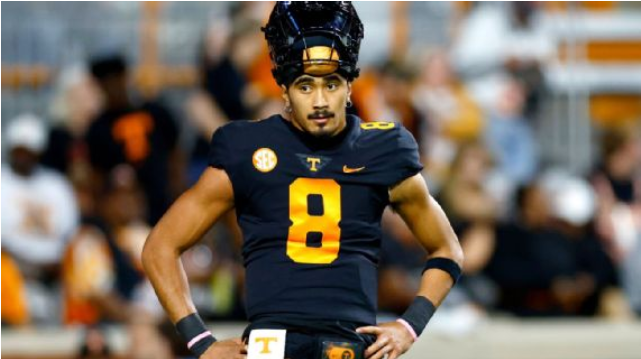Sports
The Decision That Changed His Path: Why Nico Iamaleava Left Tennessee for UCLA
1. The Rise of Nico Iamaleava: A Star on the Horizon
The Early Days and Recruitment to Tennessee
Before transferring, Nico Iamaleava was seen as one of the most promising quarterbacks in college football. The 6-foot-5, 200-pound signal-caller had an impressive high school career, drawing attention from top football programs across the country. His combination of size, athleticism, and arm strength made him a five-star recruit, and it wasn’t long before Tennessee secured his commitment.
Nico Iamaleava’s arrival at Tennessee generated excitement from both the program’s fanbase and college football enthusiasts nationwide. The Volunteers had long been in search of a quarterback to lead them back to prominence, and Nico Iamaleava was seen as the future of the program. His commitment to Tennessee raised hopes that the program could return to being a force in the SEC, and many expected him to become the face of Tennessee football for years to come.
However, the expectations placed on him were immense. Being a top recruit often comes with its fair share of pressure, and Nico Iamaleava’s early time at Tennessee saw him navigating the complexities of adapting to the collegiate game. While he had undeniable talent, his development would be put to the test in the high-pressure environment of the SEC.

2. The Decision to Transfer: What Led to Nico’s Departure?
Exploring the Factors Behind the Move
Despite being a highly touted recruit, Nico Iamaleava’s time at Tennessee was not without its challenges. There were multiple factors that led to his decision to leave Knoxville for Los Angeles, including his relationship with the coaching staff, the playing time situation, and his personal aspirations.
One of the main reasons for Nico Iamaleava’s departure was his desire for more playing time. As a highly ranked recruit, Iamaleava expected to step into a starting role immediately. However, Tennessee’s quarterback situation was complicated, and Iamaleava faced stiff competition from experienced players like Joe Milton. Milton’s status as the team’s starting quarterback placed Iamaleava in a position where he was unlikely to see the field as early as he had hoped. Despite his talent, Iamaleava found himself relegated to a backup role, something that can be particularly frustrating for a player of his caliber.
Moreover, Iamaleava’s transfer could have been influenced by a desire for a fresh start. After a period of adjustment and limited on-field success, Iamaleava may have been seeking an environment where he could make a bigger impact and develop more freely. UCLA, with its own set of challenges but a different offensive system, seemed like a more attractive option for the young quarterback.
3. The UCLA Opportunity: A Fresh Start and New Challenges
Why Iamaleava Chose UCLA Over Other Programs
After leaving Tennessee, Nico Iamaleava had several options in front of him. UCLA, led by head coach Chip Kelly, presented a new opportunity for the talented quarterback. The Bruins had a strong offensive system that could help develop Iamaleava’s skills, and Kelly’s history with quarterbacks made UCLA an appealing destination.
Imaaleava’s decision to choose UCLA over other programs was based on several key factors. UCLA’s offensive system, which focuses on an up-tempo, pass-heavy attack, provided a perfect fit for Iamaleava’s skill set. The program also presented an opportunity for Iamaleava to step into a starting role sooner than he would have at Tennessee. With the quarterback position open at UCLA, Iamaleava saw a chance to prove himself on the field and lead the Bruins’ offense.
Furthermore, Iamaleava was drawn to the environment at UCLA, both on and off the field. The opportunity to play in the Pac-12 conference and the bright lights of Los Angeles presented an attractive option for the young quarterback. The combination of competitive football, a high-profile program, and the chance to develop under an experienced coaching staff made UCLA the ideal choice for Iamaleava’s next chapter.
4. The Impact on Tennessee and UCLA: How the Transfer Affects Both Teams
Implications for Both Programs and Their Futures
Nico Iamaleava’s departure from Tennessee and his subsequent transfer to UCLA has ripple effects for both programs. For Tennessee, losing a top-tier quarterback recruit was a significant blow. The Volunteers had invested considerable time and resources in Iamaleava, and his decision to leave raised questions about the state of the program and its future recruiting efforts. However, Tennessee still has a solid quarterback in Joe Milton, who has shown flashes of brilliance and will look to lead the team moving forward. Additionally, Tennessee’s ability to attract other high-profile recruits remains strong, and the program will continue to build under head coach Josh Heupel.
For UCLA, Iamaleava’s arrival is a game-changer. The Bruins have long struggled to compete at a high level in the Pac-12, but the addition of a five-star quarterback can significantly alter the trajectory of the program. Iamaleava brings a wealth of talent and potential that could elevate UCLA’s offense to new heights. Under Chip Kelly, who has a history of developing dynamic quarterbacks, Iamaleava has the opportunity to thrive and showcase his skills on a national stage.
The move also impacts the Pac-12 conference, as UCLA’s chances of competing for a conference title improve significantly with Iamaleava at the helm. The quarterback’s presence gives UCLA a strong foundation for the future and could lead to a more competitive program in the years to come.
5. What’s Next for Nico Iamaleava: The Road Ahead
Looking to the Future: What’s Next for the Young Quarterback?
Nico Iamaleava’s decision to transfer to UCLA marks a new chapter in his football journey, and the road ahead is filled with opportunity. At UCLA, Iamaleava will have the chance to develop his skills and become a key player in one of the most exciting conferences in college football. His ability to succeed will depend on how well he adapts to Chip Kelly’s system and the level of competition he faces in the Pac-12.
As a highly skilled quarterback, Iamaleava has the potential to lead UCLA to new heights. If he can continue to develop his game and stay healthy, there’s no doubt he will become one of the top quarterbacks in college football. His future looks bright, and his time at UCLA could set him up for a successful career in the NFL.
For Iamaleava, this move represents a chance to fulfill his potential and prove that he is one of the best quarterbacks in the nation. As he embarks on this new chapter of his football career, all eyes will be on him to see how he performs under the bright lights of UCLA.
From: Prettyteesus
